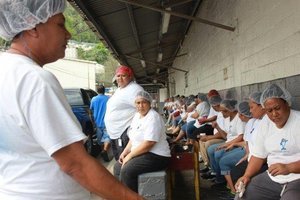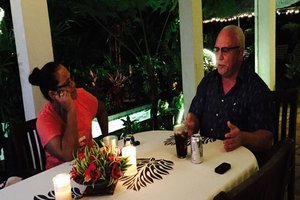A former general manager of StarKist Samoa and vice president of parent company, StarKist Co., Mr. Barry Mills, recently spent a month in the territory on a personal trip which one may say was to benefit his mind, body and especially his soul.
Mills was an employee of StarKist for 16 years, starting as StarKist Samoa’s operations manager and becoming president and general manager of the company within 12 months.
He left American Samoa when he was promoted to vice president operations of StarKist Co., and moved to the company’s headquarters in Pittsburgh.
But he continued to visit the Satala tuna plant regularly.
 Mr. Mills’ career with StarKist and the tuna industry came to an abrupt halt shortly after Korean company, Dongwon, acquired StarKist in 2008.
Mr. Mills’ career with StarKist and the tuna industry came to an abrupt halt shortly after Korean company, Dongwon, acquired StarKist in 2008.
From the time he left up to late last year, Mills has had about 7 operations to replace joints to his knees, hips and shoulders.
He’s been in and out of operating rooms and rehab centers.
Mills was a member of his school’s inter collegiate weightlifting team and while he didn’t know it at the time, those lifts did serious damage to his joints.
The joints in his lower back also need to be replaced but his doctors have told him his back is inoperable.
The Social Security Administration classifies him as 100% disabled.
Mills can walk and move around on his own, though one can detect it’s a struggle.
His speech is slightly slurred, he has given up on the drinking and has mellowed down considerably from the boisterous and colorful character he once was.
His mind is still crystal clear about the industry he knows inside out, tuna.
Mills emotion comes through when he speaks about the cannery employees, the faa Samoa and how he made the StarKist Samoa plant the people’s plant, with standard operating procedures that supervisors and employees at the production level wrote up.
Mills said he’s a firm believer that “people have a tendency to support to a greater extent something they had the opportunity to create.”
The operating model that Mills put in place at the StarKist Samoa plant was based on the values of the Samoan culture, where matai deliberate and reach consensus, and the extended family system takes care of all members.
Mills says it’s the faaSamoa that attracted him to American Samoa.
Play Audio
During Mills’ time as GM the StarKist plant boosted production from 400 to 600 tons per day and the workforce reached 3,000.
Employees received paid holidays for the first time and a point system which rewarded employee longevity and good attendance among other things for promotional purposes was established.
In addition, several of the top management positions at Starkist were localized.
It was during Mills’ tenure as GM that the first American Samoan to head the local cannery, Brett Butler, was hired and groomed for the leadership position.
For his first trip back to American Samoa since he departed StarKist, Mills arrived here on Christmas Day.
He says, “I flew in with Santa Claus.”
His reason for making the arduous trip by himself in his disabled condition all the way from Miami where he now makes his home?
He says, “I wanted to see how I felt about this place. ”
During his month long stay, the former StarKist executive reacquainted with friends and business associates, and some of his Samoan aiga.
He agreed to be interviewed in order to urge local government leaders, Congresswoman Aumua Amata and all those involved in the local tuna industry to turn their 100% attention to acquiring fishing rights for US tuna boats in the Pacific.
Mills warns that if the issue of fish supply is not resolved quickly it will be the final nail in the coffin for the tuna canning business in American Samoa.
More from our interview with Mr. Barry Mills in later news bulletins.






